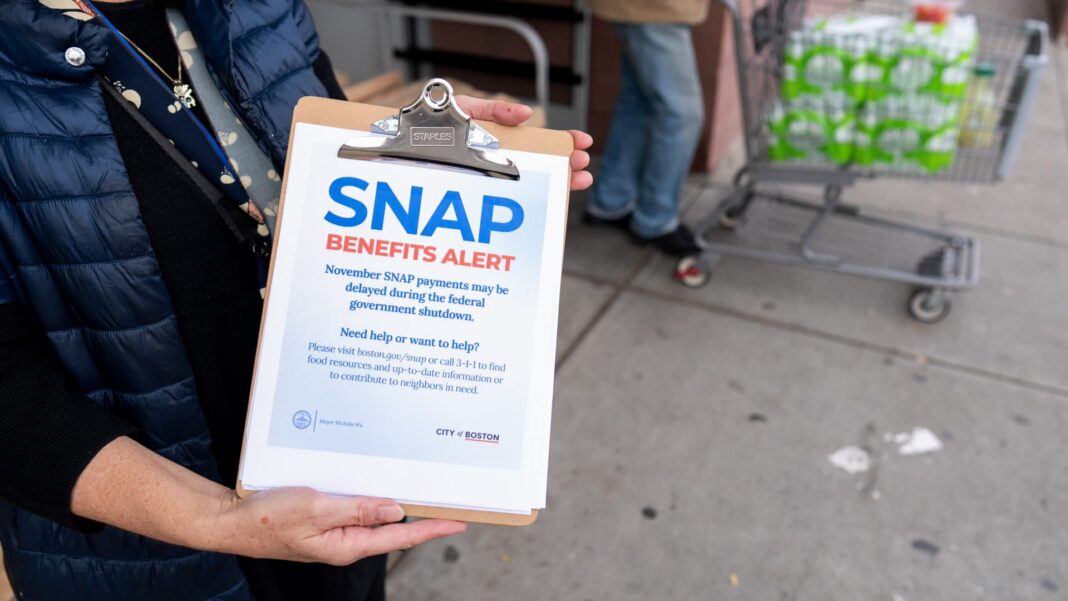A volunteer displays information on the Supplemental Nutritional Assistance Program (SNAP) at a grocery store in Dorchester, Massachusetts, US, on Monday, Nov. 3, 2025.
Mel Musto | Bloomberg | Getty Images
President Donald Trump on Tuesday suggested that the United States would not pay any SNAP benefits during the government shutdown, contradicting a court filing a day earlier by his administration.
Trump said that the benefits, which help feed 42 million Americans, will resume only after Democrats in Congress agree to pass a stopgap funding bill that would reopen the government.
The administration on Monday told a federal judge in Rhode Island that it would pay half of the costs of the SNAP benefits for November.
Trump on Tuesday said in a Truth Social post, “SNAP BENEFITS, which increased by Billions and Billions of Dollars (MANY FOLD!) during Crooked Joe Biden’s disastrous term in office (Due to the fact that they were haphazardly ‘handed’ to anyone for the asking, as opposed to just those in need, which is the purpose of SNAP!), will be given only when the Radical Left Democrats open up government, which they can easily do, and not before!”
The White House, when asked by CNBC for clarification on Trump’s statement given the court filing Monday, said, “Refer you to the President’s truth.”
White House press secretary Karoline Leavitt, at a briefing later, told reporters that “the administration is fully complying with the court order.”
Leavitt said she had spoken to Trump about his post, and added, “The recipients of these SNAP benefits need to understand it’s going to take some time to receive this money, because the Democrats have forced the administration into a very untenable position.”
“We are digging into a contingency fund that is supposed to be for emergencies, catastrophes, for war, and the president does not want to have to tap into this fund in the future, and that’s what he was referring to in his Truth Social post,” Leavitt said.
She also said that the U.S. Department of Agriculture had issued guidance on Tuesday to individual states about the amount of money being disbursed to SNAP recipients.
The social media post came shortly after lawyers for plaintiffs in a court case challenging the administration’s cessation of SNAP benefits told a federal judge in Rhode Island that the decision to pay partial benefits out of a contingency fund did not meet his prior order that any decision to make partial payments “cannot be arbitrary and capricious.”
The judge, Jack McConnell, had told the administration on Friday that it needed to pay SNAP benefits as soon as possible out of a contingency fund, and that is also needed to investigate whether other federal funds could be used to keep the program fully funded in the absence of a new appropriation by Congress.
The Trump administration on Monday told McConnell that it would use all of the $4.65 billion remaining in the contingency fund, but said it had declined to use at least $4 billion from the Child Nutrition Program to keep SNAP fully funded for November, at least.
Lawyers for plaintiffs in the case told McConnell on Tuesday, “The Court should grant a temporary restraining order and preliminary stay on the ground that Defendants’ decision not to provide full SNAP benefits — even though they have funds available to do so and even though switching to partial payments at this late date will cause devastating delay — is arbitrary and capricious.”
McConnell later told the Trump administration to respond to the request by Wednesday.
The dispute over the continuation of the SNAP benefits in the past week has become a major issue in the ongoing U.S. government shutdown, which began Oct. 1.
Past presidential administrations have continued disbursing funds for SNAP during prior government shutdowns.
But the Trump administration recently said SNAP benefits would end this week because Congress had not approved funding needed to continue the program during the shutdown. The administration, in what is seen as an effort to pressure Democrats in Congress to vote to end the shutdown, also refused to use more than $4 billion in contingency funds that Congress had set aside explicitly for SNAP.
Separate groups of plaintiffs then sued the Department of Agriculture in different federal courts to compel the department to continue paying the benefits.




